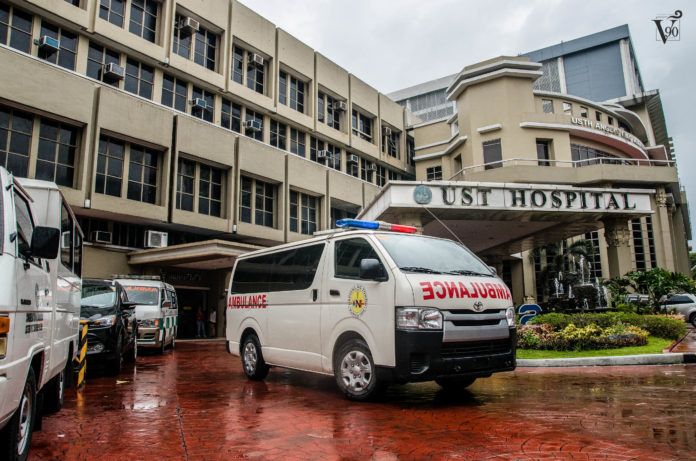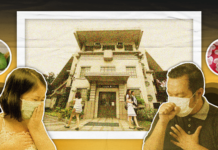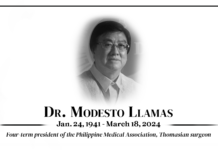THERE is no need to panic over reported Dengvaxia vaccine-linked deaths as most of their findings are inconsistent with dengue, an infectious diseases expert from the University said.
Dr. Daisy Ilagan-Tagarda, a visiting consultant at the UST Hospital, said the bleeding detected in the remains of some anti-dengue vaccine recipients was “not a specific manifestation of dengue” as it could be caused by blood diseases and other infections.
“It is not proven that [these] deaths were strongly associated with Dengvaxia and most of these deaths are secondary to other causes like severe bacterial infection, autoimmune diseases like lupus and [blood] malignancy,” Tagarda told the Varsitarian.
Last Feb. 2, the Philippine General Hospital-Dengue Investigative Task Force (PGH-DITF) reported that out of the 14 children who died after receiving Dengvaxia, 11 did not die of dengue but of other existing ailments, while three died of “dengue shock syndrome.”
Dengue shock syndrome is a severe form of dengue fever caused by the dengue virus which results in bleeding or hemorrhage, abdominal pain and shock.
Dengue fever is transmitted to a person through the bite of an Aedes aegypti mosquito carrying the dengue virus.
Since April 2016, a total of 830,000 children in the Philippines have received Dengvaxia, the world’s first dengue vaccine.
The PGH-DITF suspected vaccine failure as the cause of deaths of two out of the three children who reportedly died of the syndrome.
Risks
Seronegative individuals, who were those previously uninfected with the dengue virus, would have a risk of “severe dengue” if given Dengvaxia but the risk was only around two for every 1000 vaccine recipients, said Tagarda, an instructor at the Faculty of Medicine and Surgery.
According to the World Health Organization, severe dengue is a “relatively rare but serious complication following dengue infection due to plasma leaking, fluid accumulation, respiratory distress, severe bleeding or organ impairment.”
“[Just] like other vaccines, it is not 100 percent guaranteed that you will not acquire dengue once you receive [Dengvaxia]. But individuals who had dengue prior to vaccination, or the seropositive individuals, will benefit from Dengvaxia because its vaccine efficacy rate is about 81.9 percent,” Tagarda said.
With an 81.9-percent vaccine efficacy rate of Dengvaxia, eight out of 10 seropositive vaccine recipients will not likely be infected with dengue, she explained.
Previous dengue infection could not be accurately evaluated through history and physical examination because many of the seropositive individuals could have a “very mild manifestation” or even without any symptom, Tagarda said.
“For the meantime, as there is still no accurate means to determine previous dengue infection, the [Dengvaxia] program should be suspended. However, if an accurate test will be available to diagnose previous dengue infection, then they can implement the program again,” she added.
The P3.5-billion dengue vaccination program in public schools in Metro Manila, Calabarzon and Central Luzon started in April 2016 under former Health Secretary Janette Garin.
In Dec. 2017, Health Secretary Francisco Duque III temporarily suspended the program after Dengvaxia manufacturer Sanofi Pasteur announced in November that the vaccine might increase “risk of hospitalization” due to dengue and severe dengue for those who did not have dengue yet.
No subject died during the phase three of the clinical trial
of Dengvaxia which results were released in Sept. last year, Tagarda noted.
Tagarda said that the public should be “objective” on the Dengvaxia matter and should listen to the right health experts.
She added that they should also be vigilant and should consult doctors immediately if dengue-like symptoms such as fever, headache and body weakness would occur.
Common side effects like pain on the injection site and allergic reactions were “adverse” reactions associated with Dengvaxia, she said.
“Other vaccination programs that were proven very effective to prevent diseases and deaths are not being supported anymore because of the Dengvaxia scare. There are already
measles outbreaks in different parts of the Philippines because of the decreasing number of Filipinos supporting immunization program[s],” she said.
“I would rather recommend that people who are more knowledgeable on this matter should give [more] information about the [Dengvaxia] controversy,” she added.
Dr. Jovencio Apostol, a pharmacist from the University, said the public should know that while there was no “perfect vaccine”, the case of Dengvaxia was specific and should not be implied on other vaccines available.
“It is unfortunate and unfair that the public should be scared of immunization in general to the point that even deworming efforts are derailed. [But] experts in public health and the public alike are encouraged to remain vigilant [in case] of the adverse effects of vaccines and report them to the proper authorities,” Apostol told the Varsitarian.














